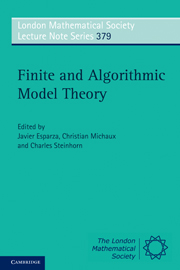Book contents
- Frontmatter
- Contents
- Preface
- 1 Automata-based presentations of infinite structures
- 2 Logical aspects of spatial databases
- 3 Some connections between finite and infinite model theory
- 4 Definability in classes of finite structures
- 5 Algorithmic meta-theorems
- 6 Model theoretic methods for fragments of FO and special classes of (finite) structures
- Bibliography
2 - Logical aspects of spatial databases
Published online by Cambridge University Press: 01 June 2011
- Frontmatter
- Contents
- Preface
- 1 Automata-based presentations of infinite structures
- 2 Logical aspects of spatial databases
- 3 Some connections between finite and infinite model theory
- 4 Definability in classes of finite structures
- 5 Algorithmic meta-theorems
- 6 Model theoretic methods for fragments of FO and special classes of (finite) structures
- Bibliography
Summary
Introduction
In this chapter, we consider spatial databases that are modeled as semi-algebraic sets and we present some logic-based languages to query them. We discuss various properties of these query languages, mainly concerning their expressive power.
The basic query language in this context is first-order logic over the real numbers extended with predicates to address the spatial database relations (Section 2.2). We discuss geometric properties that are expressible in this logic (Section 2.3) and then focus on first-order expressible topological properties of 2-dimensional spatial datasets. A property is called topological if it is invariant under homeomorphisms of the ambient space. We give a characterization of topological elementary equivalence and present a point-based language, called cone logic that captures exactly the topological queries expressible in first-order logic over the reals (Section 2.4 and 2.7). Next, we present another point-based language that captures the first-order queries that are invariant under affinities (Section 2.6).
The second half of this chapter is devoted to extensions of first-order logic over the reals with some form of recursion. We briefly discuss two such extensions: spatial Datalog and first-order logic extended with a while-loop (Section 2.8). We discuss in more detail extensions of first-order logic with different types of transitive-closure operators, with or without stop-conditions (Section 2.9) and investigate their expressive power (Section 2.10). The evaluation of queries expressed in transitive-closure logic with or without stop conditions may be non-terminating.
- Type
- Chapter
- Information
- Finite and Algorithmic Model Theory , pp. 77 - 108Publisher: Cambridge University PressPrint publication year: 2011



